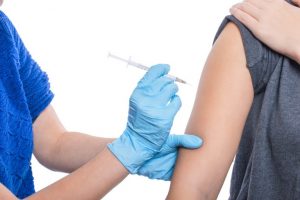HPV Vaccination: What You Need to Know
January is recognized as Cervical Cancer Awareness Month. During this month, BCHA sets out with the intention of raising awareness of the preventable cancer. To provide our patients with education about prevention, screening options and treatments, we sat down for a Q&A with Jenniver Duvall, PA-C at BCHA.
Why should you get your teenager’s HPV vaccinations?
Human papillomavirus (HPV) is the most common sexually transmitted infection in the US and the vaccine protects against particular strains of it. Nearly 80 million Americans are currently infected with HPV and approximately 14 million people become newly infected each year.
How is it cancer protection?
HPV is known to cause cancers of the throat, cervix, vagina, vulva, penis, and anus. Since the vaccine can protect against certain high risk strains of HPV, it can prevent more than 90% of HPV cancers.
What ages should your child get their vaccinations?
Ideally, Gardasil is given to boys and girls between the ages of 11-12 before being exposed to HPV. The body’s immune response to the vaccine seems best at this age range. It can be given as early as nine years of age.
What if you missed your HPV vaccination during childhood? Can a patient catch up?
Yes, it should be given as soon as possible followed by the appropriate immunization schedule. It is given in a series of two or three doses, depending on the age it is started. The vaccine is recommended for ages 9-26, even if the individual has already been diagnosed with HPV. Some adults between the ages of 27-45 may benefit from vaccination depending on risks for new HPV infections. They can discuss this with their healthcare provider.
What else should patients know about cervical cancer and the HPV vax?
For most women, HPV will go away on its own; however, if it does not, there is a chance that over time it may cause cervical cancer.
Some things that increase your risk of developing cervical cancer are being immunocompromised, smoking, being on birth control pills for five or more years, and giving birth to three or more children.
Cervical cancer may not cause any signs or symptoms. Advanced cervical cancer may cause abnormal bleeding or discharge.
Cervical cancer is the easiest gynecologic cancer to prevent with regular screening tests and follow-ups. It also is highly curable when found and treated early. However, each year, approximately 12,000 women in the United States are diagnosed with cervical cancer and more than 4,000 women die.
Getting the vaccine does not eliminate the need for cervical cancer screening.
HPV has been recommended since 2006 and has proven to be safe and effective. However, there are some people that should not get the vaccine, such as people with a life threatening allergic reaction to any ingredient of HPV or to a previous HPV vaccine, people who have an allergy to yeast, or people who are pregnant.
The Vaccines for Children (VFC) program provides vaccines at no cost to children ages 18 years and younger who are uninsured and Medicaid-eligible.
What screening options does BCHA have for cervical cancer?
BCHA offers PAP tests and HPV testing. We start screening PAP tests at 21 and HPV testing at 30.
To help prevent false-negative or false-positive results, you should avoid douching, sexual intercourse, and using vaginal medications or hygiene products for two days before your test.
If you have a low income or do not have insurance, you may be able to get a free or low-cost cervical cancer screening test through the National Breast and Cervical Cancer Early Detection Program or Family Planning.
If you have questions or would like to learn more, contact BCHA today.
GETTING TO KNOW KAITLIN JONES, PA-C: OUR NEWEST QUICK CARE PROVIDER
GETTING TO KNOW KAITLIN JONES, PA-C: OUR NEWEST QUICK CARE PROVIDER Barbour Community Health Association is always excited to welcome new team members who
Keep Your K-12 Child On Track with Annual Well-Child Visits
Keep Your K-12 Child On Track with Annual Well-Child Visits Children grow and change rapidly as they advance from toddlers to teens to young
Overcoming the Winter Blues: The Guide to Seasonal Depression Care
Overcoming the Winter Blues: The Guide to Seasonal Depression Care As the days grow shorter and colder, many people experience more than just the


